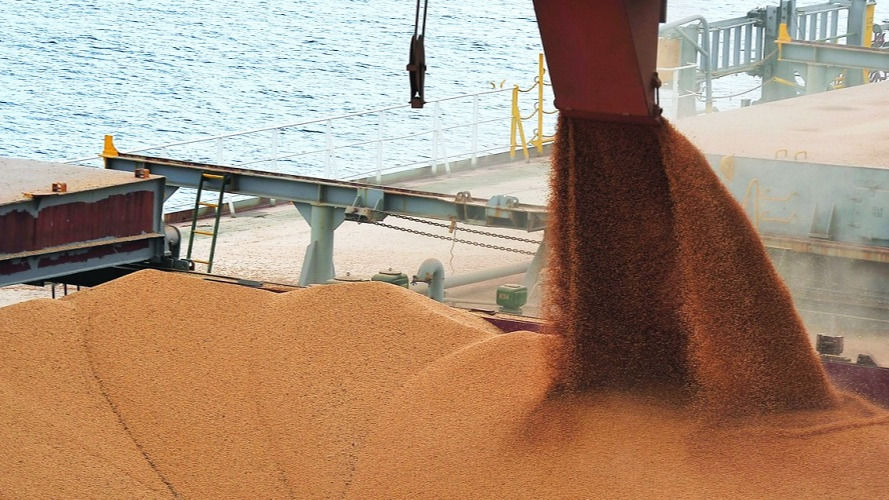China Expected to Import Record Soybean Volumes in July Due to Low Prices and Trade War Concerns
- Ipasai News

- Jul 2, 2024
- 3 min read

China is projected to import record volumes of soybeans in July, driven by lower prices and concerns over potential trade tensions should Donald Trump return to the U.S. presidency. Traders and analysts have noted a significant increase in Chinese soybean imports in recent weeks.
"Chinese soybean importers are purchasing larger volumes as a precaution against potential tariff increases in the event of a renewed trade war following the U.S. elections," said Vitor Pistoia, an analyst at Rabobank in Sydney.
While any escalation in trade tensions might impact Chinese soybean buyers, the effect is likely to be less severe than during Trump's presidency, when a 25% tariff on U.S. soybeans led to a shift towards South American suppliers. This shift significantly reduced U.S. soybean exports to China from 32.9 million tons in 2017 to 16.6 million tons in 2018.
Despite a 2020 agreement between the U.S. and China to increase agricultural imports, Brazil has solidified its position as the dominant soybean supplier to China. In 2023, Brazil accounted for 70% of China's soybean imports, with the U.S. contributing 24%.
Chinese buyers have booked approximately 12 to 13 million tons of soybeans for July, compared to 9.73 million tons in the same month the previous year. China's monthly soybean imports reached a record 12.02 million tons in May 2023.
"Without the fear of a trade war, July's purchases would have been around 10 million tons," said an anonymous trader. The low prices are a significant factor, with Chicago soybean futures hitting their lowest level since 2020 due to expectations of a bumper global soybean crop.
The USDA forecasts a record global soybean production of 422.26 million tons in 2024/25, up from 395.91 million tons in the current marketing year.
Most of China's soybean imports are sourced from Brazil. Luiz Fernando Roque, an analyst at Brazilian consultancy Safras & Mercado, stated that a weaker Brazilian real against the dollar encourages soybean exports. While he doesn't see the prospect of Trump's return to office as currently impacting the Brazilian market, he acknowledged the potential risks given past trade tensions.
"The likelihood of Trump's victory appears increasingly likely, posing risks for China based on previous experiences," Roque said.China is projected to import record volumes of soybeans in July, driven by lower prices and concerns over potential trade tensions should Donald Trump return to the U.S. presidency. Traders and analysts have noted a significant increase in Chinese soybean imports in recent weeks.
"Chinese soybean importers are purchasing larger volumes as a precaution against potential tariff increases in the event of a renewed trade war following the U.S. elections," said Vitor Pistoia, an analyst at Rabobank in Sydney.
While any escalation in trade tensions might impact Chinese soybean buyers, the effect is likely to be less severe than during Trump's presidency, when a 25% tariff on U.S. soybeans led to a shift towards South American suppliers. This shift significantly reduced U.S. soybean exports to China from 32.9 million tons in 2017 to 16.6 million tons in 2018.
Despite a 2020 agreement between the U.S. and China to increase agricultural imports, Brazil has solidified its position as the dominant soybean supplier to China. In 2023, Brazil accounted for 70% of China's soybean imports, with the U.S. contributing 24%.
Chinese buyers have booked approximately 12 to 13 million tons of soybeans for July, compared to 9.73 million tons in the same month the previous year. China's monthly soybean imports reached a record 12.02 million tons in May 2023.
"Without the fear of a trade war, July's purchases would have been around 10 million tons," said an anonymous trader. The low prices are a significant factor, with Chicago soybean futures hitting their lowest level since 2020 due to expectations of a bumper global soybean crop.
The USDA forecasts a record global soybean production of 422.26 million tons in 2024/25, up from 395.91 million tons in the current marketing year.
Most of China's soybean imports are sourced from Brazil. Luiz Fernando Roque, an analyst at Brazilian consultancy Safras & Mercado, stated that a weaker Brazilian real against the dollar encourages soybean exports. While he doesn't see the prospect of Trump's return to office as currently impacting the Brazilian market, he acknowledged the potential risks given past trade tensions.
"The likelihood of Trump's victory appears increasingly likely, posing risks for China based on previous experiences," Roque said.






Comments